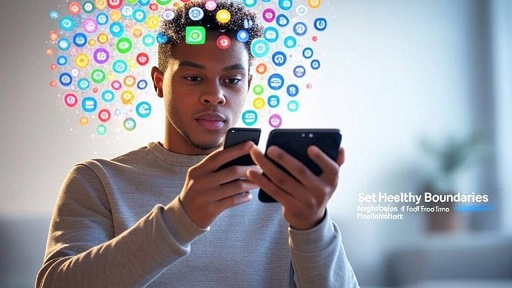Hooked on Your Phone? Understanding Smartphone Addiction and Setting Healthy Boundaries
Hooked on Your Phone? Understanding Smartphone Addiction and Setting Healthy Boundaries

Why It’s Hard to Put Down Your Phone
1. Dopamine and the Reward System
At the heart of smartphone addiction lies the brain's reward system. Every notification, like, or swipe triggers a release of dopamine, the neurotransmitter responsible for feelings of pleasure and reward. This creates a feedback loop similar to gambling, where we continually seek the next "hit." Over time, this cycle, often referred to as "digital dopamine addiction," leaves us craving more interactions while feeling unsatisfied and disconnected from the present.
2. Endless Content and FOMO
Social media and app algorithms are specifically designed to keep us engaged by feeding personalized content, leading to endless scrolling. Adding to this is the Fear of Missing Out (FOMO), the anxiety that we might miss something exciting or important. This combination keeps us glued to our screens.
3. Multitasking and Attention Fragmentation
Smartphones enable us to juggle multiple tasks at once, but this often fragments our attention. Constantly switching between apps, notifications, and tasks reduces productivity and increases stress, making it harder to focus.
4. Social Expectations and Connectivity
Smartphones act as social hubs, creating an expectation to always be available and responsive. This constant connectivity blurs the boundaries between personal time and work time, making it difficult to unplug.
5. Emotional Attachment
For many, a phone isn’t just a tool—it’s a source of comfort, entertainment, and connection. In moments of loneliness or boredom, reaching for the phone feels natural. Letting go of such an emotionally supportive device can be intimidating.
How to Set Healthy Boundaries
1. Practice Mindful Use
Start by observing your phone habits. Tools like screen time trackers can help you identify patterns. Acknowledge when you're using your phone out of habit instead of necessity. Consciously choose moments to step away from your device and be fully present.
2. Set Physical and Digital Boundaries
Designate phone-free zones or times, such as during meals or before bed. Physically, consider leaving your phone in another room. Digitally, enable "Do Not Disturb" or use app limits to reduce distractions.
3. Simplify Your Digital Space
Decluttering your digital environment can make a big difference. As Shira Gill suggests in her book Lifestyled, organize your home screen, remove non-essential apps, and archive emails to minimize digital overload.
4. Cultivate Offline Interests
Engage in activities that don’t involve screens, like reading, exercising, or crafting. These hobbies not only reduce screen time but also enrich your life in meaningful ways.
5. Reevaluate Notifications
Most notifications are not urgent. Turn off non-essential alerts to minimize interruptions and reduce the compulsion to check your phone every time it buzzes.
6. Foster Social Agreements
If you live with others, set shared phone boundaries. For example, agree to keep phones away during family meals or movie nights to encourage genuine interaction.
7. Gradual Detox
For those deeply dependent on their devices, quitting cold turkey can feel overwhelming. Instead, start with small increments of phone-free time and gradually increase them. This approach makes it easier to adjust.
8. Seek Professional Help
If managing your phone use feels unmanageable, consider consulting a therapist or joining support groups focused on digital addiction. Professional guidance can provide tailored strategies to regain control.
Striking a Balance
Smartphones are undeniably convenient and powerful tools, but excessive use can harm our well-being. By understanding the psychological mechanisms that keep us hooked and implementing practical strategies for setting boundaries, we can develop a healthier relationship with our devices. This balance allows us to enjoy the benefits of technology without letting it dominate our lives.
#SmartphoneAddiction #HealthyBoundaries #DigitalWellness #MindfulLiving #MentalHealth #MetroPsychologist
© 2025 metropsychologist.com
